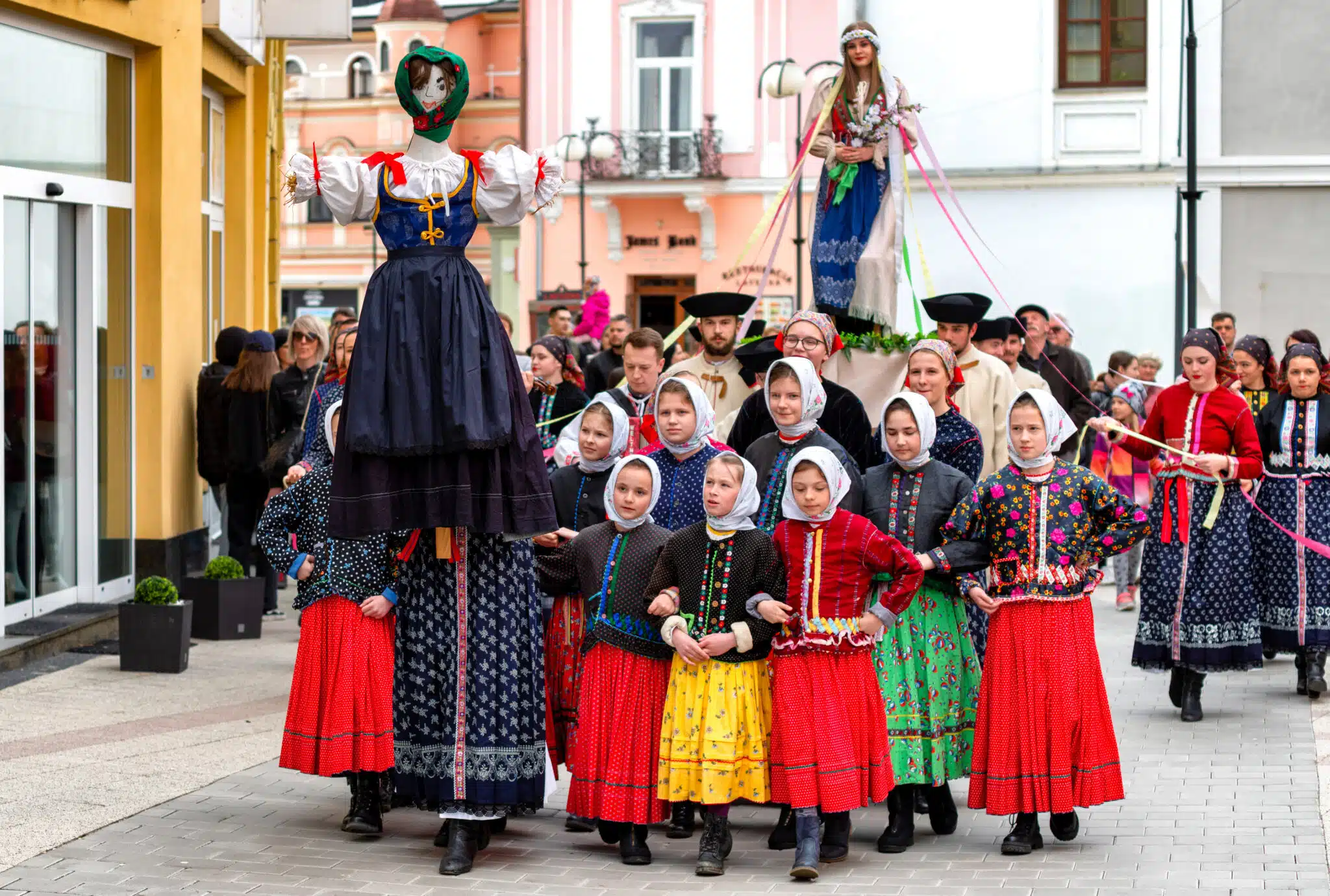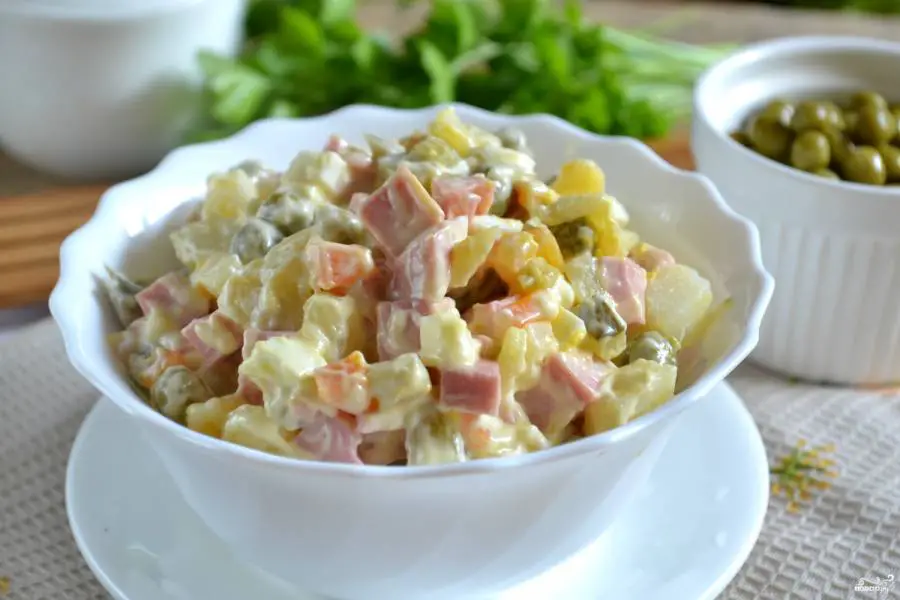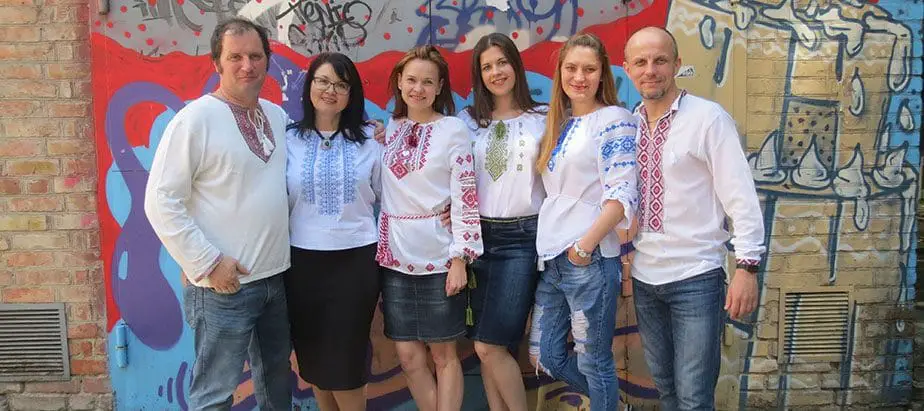Learn Ukrainian with this free phrasebook and its recordings made by native Ukrainian language speakers. For a deeper learning experience, see these online and study abroad experiences from SRAS!
Ukrainian is a Slavic language that is primarily spoken in Ukraine, with approximately 45 million speakers worldwide. Its roots lie in Old East Slavic language, which was spoken in the medieval Kyivan Rus’ state. While Russian and Ukrainian share a common root, they developed separately, with Ukrainian being influenced by Ukraine’s time under Polish and Austro-Hungarian while Russian absorbed more influence from Mongol rule and later from the popularity of French at the Tsarist court. Since Ukraine became independent in 1991, Ukrainian has become the state language of Ukraine and an important part of the country’s development of a national identity.
The Talking Phrasebook Series, of which the following entry is a part, presents useful phrases and words in side-by-side translation and with audio files specifically geared to help students work on listening skills and pronunciation. Each entry below, divided by category, features an English word or phrase in the left column and its Ukrainian translation in the right. The Ukrainian is presented in in English transliteration on top and in the original Cyrillic below that.
In the center column for each row is a play button. The recorded file will feature first English, then the Ukrainian in three versions: one slow, one with each syllable broken out, and a last version that will be spoken as it might be overheard in a conversation between native speakers.
Survival Basics for Ukrainian
| Hello! | Привіт! (pryvit!) |
|
| Yes | Так (tak) |
|
| No | Ні (Ni) |
|
| Good morning! | Доброго ранку! (dobroho ranku!) |
|
| Good evening! | Добрий вечір! (Dobroho vechora!) |
|
| What’s up? | В чому справа? (v chomu sprava?) |
|
| What’s up? | Що трапилося? (Shcho trapylosya?) |
|
| How are you? | Як справи? (Yak spravy?) |
|
| Good, thanks, and you? | Добре, дякую, а ти як? (Dobre, dyakuyu, a ty yak?) |
|
| Good bye! | До побачення! (Do pobachennya!) |
|
| See you later! | Побачимось! (Pobachymos`!) |
|
| Sorry! | Вибачте! (Vybachte!) |
|
| Open/closed | Відчинено/Зачинено (vidchyneno/zachyneno) |
|
| Pull/push | До себе/ від себе (do sebe/ vid sebe) |
|
| Small/big | Маленький/ великий (malen`kyi/velykyi) |
|
| Do you speak English? | Ви говорите англійською? (Vy hovoryte anhliys`koyu?) |
|
| I don’t speak English. | Я не говорю англійською. (Ya ne hovoryu anhliys`koyu) |
|
| I only speak a little Ukrainian | Я лише трохи розмовляю українською (Ya lyshe trokhy rozmovlyayu ukrayins`koyu) |
|
| I understand. | Я розумію. (Ya rozumiyu) |
|
| I don’t understand. | Я не розумію. (Ya ne rozumiyu) |
|
| Thank you! | Дякую! (Dyakuyu!) |
|
| Thank you very much! | Дуже дякую! (Duzhe dyakuyu!) |
|
| Very well, thanks! | Дуже добре, дякую! (Duzhe dobre, dyakuyu!) |
|
| Good | Добре (Dobre) |
|
| Please | Будь ласка (Bud`laska) |
|
| Please | Прошу (Proshu) |
|
| You’re welcome! | Немає за що! (Nema za shcho!) |
|
| Excuse me! | Перепрошую! (Pereproshuyu!) |
|
| A little | Трішки (Trishky) |
|
| Could you speak more slowly? | Ви можете говорити повільніше? (Vy mozhete hovoryty povil`nishe?) |
|
| Could you repeat that, please? | Можете повторти, будь ласка? (Mozhete povtoryty , budʹ laska?) |
|
| Could you write that down? | Ви можеш це записати? (Vy mozhete tse zapysaty?) |
|
| My bag/wallet/passport was stolen | Мою сумку/ мій гаманець/ паспорт вкрали (Moyu sumku/ miy hamanets`/ pasport vkraly) |
|
| I need a doctor! | Мені потрібен лікар! (Meni potriben likar!) |
|
| Call the police! | Викличте поліцію! (Vyklychte politsiyu!) |
Introductions in Ukrainian
| What is your name? | Як тебе звати? (Yak tebe zvaty?) |
|
| Pleased to meet you | Приємно познайомитися. (Pryyemno poznayomytysya). |
|
| I am 25 years old. | Мені двадцять п’ять років. (Meni dvadtsyat` p`yat` rokiv.) |
|
| How old are you? | Cкільки тобі років? (Skil`ky tobi rokiv?) |
|
| Where are you from? | Звідки ти? (Zvidky ty?) |
|
| I am American. | Я американець/ американка. (Ya amerykanets`/ amerykanka.) |
|
| No, I am from Canada. | Ні, я з Канади. (Ni, ya z Kanady.) |
|
| She is Austrian. | Вона австрійка. (Vona avstriyka.) |
|
| He is Irish. | Він ірландець. (Vin irlandets`.) |
|
| We are from New Zealand. | Ми з Нової Зеландії. (My z Novoyi Zelandiyi.) |
|
| They are from Wales. | Вониз Уельсу. (Vony z Uel`su.) |
|
| How do you like Kyiv? | Як тобі Київ? (Yak tobi Kyyiv?) |
|
| I like Kyiv very much. | Мені дуже подобається Київ . (Meni duzhe podobayet`sya Kyyiv ) |
|
| Have you ever been to Odessa? | Ти вже відвідував Одесу? (Ty vzhe vidviduvav Odesu?) |
|
| I have never been to Odessa before. | Я ніколи не був в Одесі. (Ya nikoly ne buv v Odesi.) |
|
| This is my second time in Ukraine. | Я вдруге в Україні. (Ya vdruhe v Ukrayini .) |
|
| What do you do? | Що ти робиш? (Shcho ty robysh?) |
|
| I am a student/businessman/teacher/doctor. | Я студент/бізнесмен/вчитель/лікар. (Ya student/biznesmen/vchytel`/likar.) |
|
| I am on vacation. | Я у відпустці. (Ya u vidpusttsi.) |
|
| I am here on business. | Я тут по справах. (Ya tut po spravakh.) |
Asking Directions
| Where are the toilets? | Де туалет? (De tualet?) |
|
| Men | Чоловічий (cholovichyy (tualet) |
|
| Women | Жіночий (Zinochyy) |
|
| Where is the bank? | Де банк? (De bank?) |
|
| Where is the post office? | Де поштове відділення? (De poshtove viddilennya ?) |
|
| Where is the train station? | Де залізничний вокзал? (De zaliznychnyy vokzal ?) |
|
| Where can I find Wi-Fi? | Де я можу знайти Wi-fi? (De ya mozhu znayty Wi-Fi?) |
|
| How do I log onto the Wi-Fi | Як підключитися до Wi-Fi? (Yak pidklyuchytysya do Wi-Fi?) |
|
| Excuse me, could you help me order a taxi? | Вибачте, можете допомогти мені замовити таксі? (Vybachte, mozhete dopomohty meni zamovyty taksi?) |
|
| Straight ahead! | Прямо/ попереду! (Pryamo/ poperedu!) |
|
| Take a right! | Праворуч! (Pravoruch!) |
|
| Take a left! | Ліворуч! (Livoruch!) |
|
| After the stoplight | За світлофором. (Za svitloforom) |
|
| Next | Наступний/ далі/ після (Nastupnyy/ dali/ pislya) |
|
| First | Перша (ий) (persha (yy)) |
|
| Last | Останній (ostanniy) |
Shopping
| How much does that cost? | Скільки коштує? (Skil`ky koshtuye?) |
|
| The menu, please! | Меню, будь ласка! (Menyu, bud` laska!) |
|
| I’d like a beer, please! | Пиво, будь ласка! (Pyvo, bud` laska!) |
|
| I would like to pay. | Хочу заплатит! (Khochu zaplatyty!) |
|
| Do you accept credit cards? | Ви приймаєте кредитки? (Vy pryymayete kredytky?) |
Counting
| 0 | нуль ( nul`) |
|
| 1 | один (odyn) |
|
| 2 | два (dva) |
|
| 3 | три (try) |
|
| 4 | чотири (chotyry) |
|
| 5 | п’ять (p`yat`) |
|
| 6 | шість ( shist`) |
|
| 7 | сім (sim) |
|
| 8 | вісім (visim) |
|
| 9 | дев’ять (dev`yat`) |
|
| 10 | десять (desyat`) |
|
| 11 | одинадцять (odynatsyat`) |
|
| 12 | дванадцять (dvanadtsyat`) |
|
| 13 | тринадцять (trynadtsyat`) |
|
| 14 | чотирнадцять (chotyrnadtsyat`) |
|
| 15 | п’ятнадцять (p`yatnadtsyat`) |
|
| 16 | шістнадцять (shistnadtsyat`) |
|
| 17 | сімнадцять (simnadtsyat`) |
|
| 18 | вісімнадцять (visimnadtsyat`) |
|
| 19 | дев’ятнадцять (dev`yatnadtsyat`) |
|
| 20 | двадцять (dvadtsyat`) |
|
| 21 | двадцять один (dvadtsyat` odyn) |
|
| 22 | двадцять два (dvadtsyat` dva) |
|
| 30 | тридцять (trydtsyat`) |
|
| 40 | сорок (sorok) |
|
| 50 | п’ятдесят (p`yatdesyat) |
|
| 60 | шістдесят (shistdesyat) |
|
| 70 | сімдесят (simdesyat) |
|
| 80 | вісімдесят (visimdesyat) |
|
| 90 | дев’яносто (dev`yanosto) |
|
| 100 | сто (sto) |
|
| 111 | сто одинадцять (sto odynatsyat` ) |
|
| 125 | Сто двадцять п’ять (sto dvadtsyat`p`yat` ) |
|
| 200 | двісті (dvisti) |
Additional Resources for Understanding Ukrainian
For a deeper learning experience, see these online and study abroad experiences from SRAS!

Kupala: Ancient Slavic Midsummer Mythology and its Modern Celebration
Kupala is an ancient Slavic holiday celebrating the summer solstice, or midsummer. Once part of a series of annual rituals, it marked and was believed to sustain agricultural cycles—essential to early human survival. Held as vitally important, these pagan traditions remained deeply rooted even after Christianization, technological change, and centuries of oppression tried to dislodge […]

Kulich, Paska, Nazuki: The Easter Breads of Eastern Christianity
Easter breads such as kulich, paska, choreg, and nazuki are delicious Easter traditions. Easter is by far the most important religious holiday for those practicing Eastern Christianity. In addition to church services and egg dying, the holiday is also marked across the cultures by ritual bread baking. Despite the wide geographic area covered by Eastern […]

Maslenitsa, Masliana, Meteņi: Spring Holidays of the Slavs and Balts
Rites of welcoming spring and saying goodbye to winter are some of the oldest holidays preserved across Slavic cultures. In the Baltics, the celebrations were nearly lost after being suppressed by Catholic and imperial dominance. Today, Russia’s Maslenitsa is by the far the best-known, but multiple versions exist across the diverse Slavic landscape. In the […]

Pierogi, Pīrāgi, Varenyky: A Tour of Pastries and Dumplings
The dumplings and pastries of Europe’s northeastern flank have a story to tell. Their recipes, etymologies, and related traditions are intertwined in a complex historical knot. There are so many ancient connections that it is almost impossible to say which influenced the next. And yet, each dish is held up as a unique and integral […]

Olivier and Rasols Salads: Holiday Traditions With Fascinating Histories
Russia’s Olivier Salad (Салат «Оливье») and Latvia’s rasols are well-known staples of their respective cuisines and common additions to holiday tables. Today, the recipes for both are quite similar, with chopped vegetables, egg, and meat dressed with mayonnaise. Olivier is now eaten throughout the former USSR and has even become common as “Russian Salad” in […]





